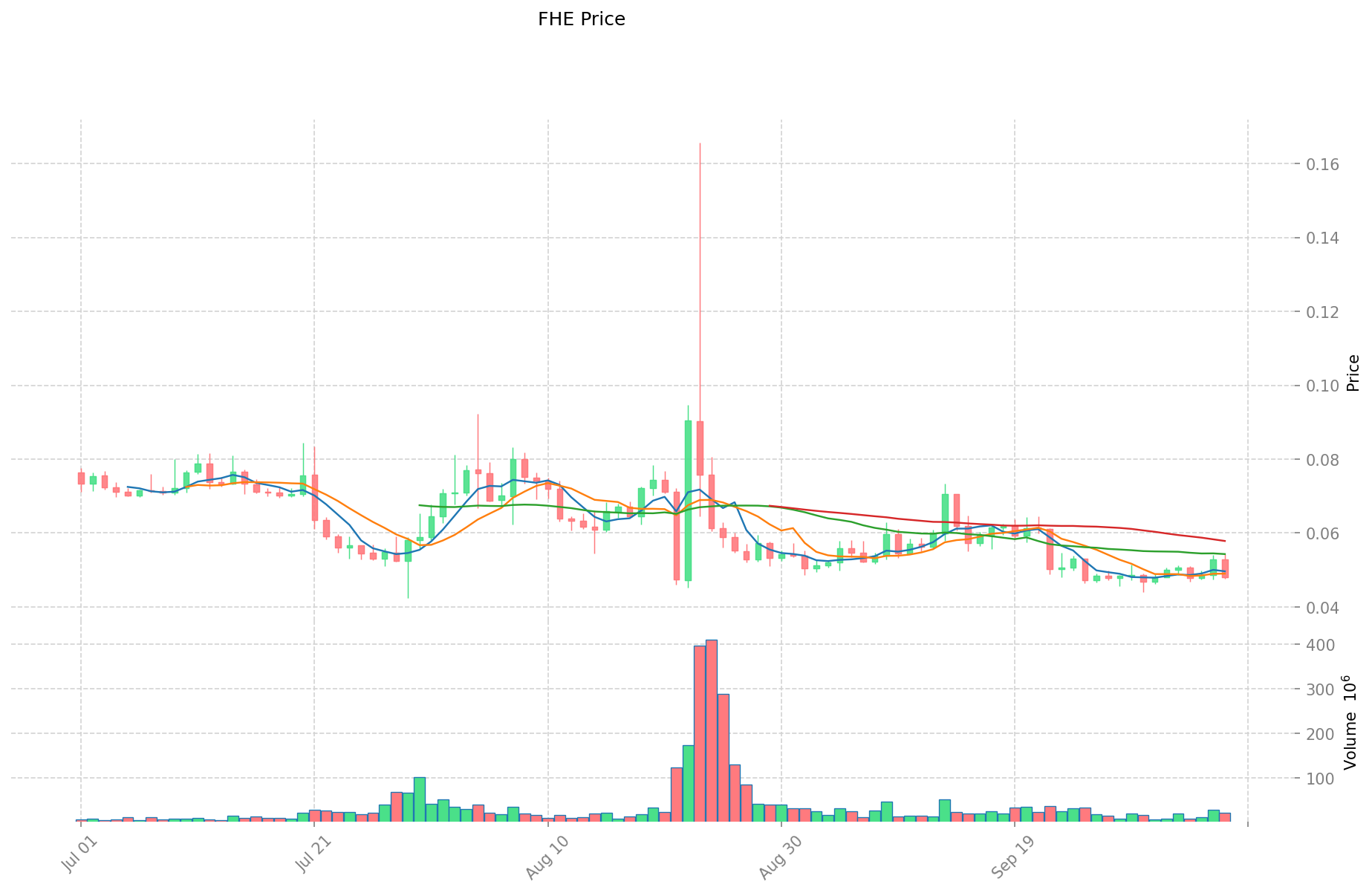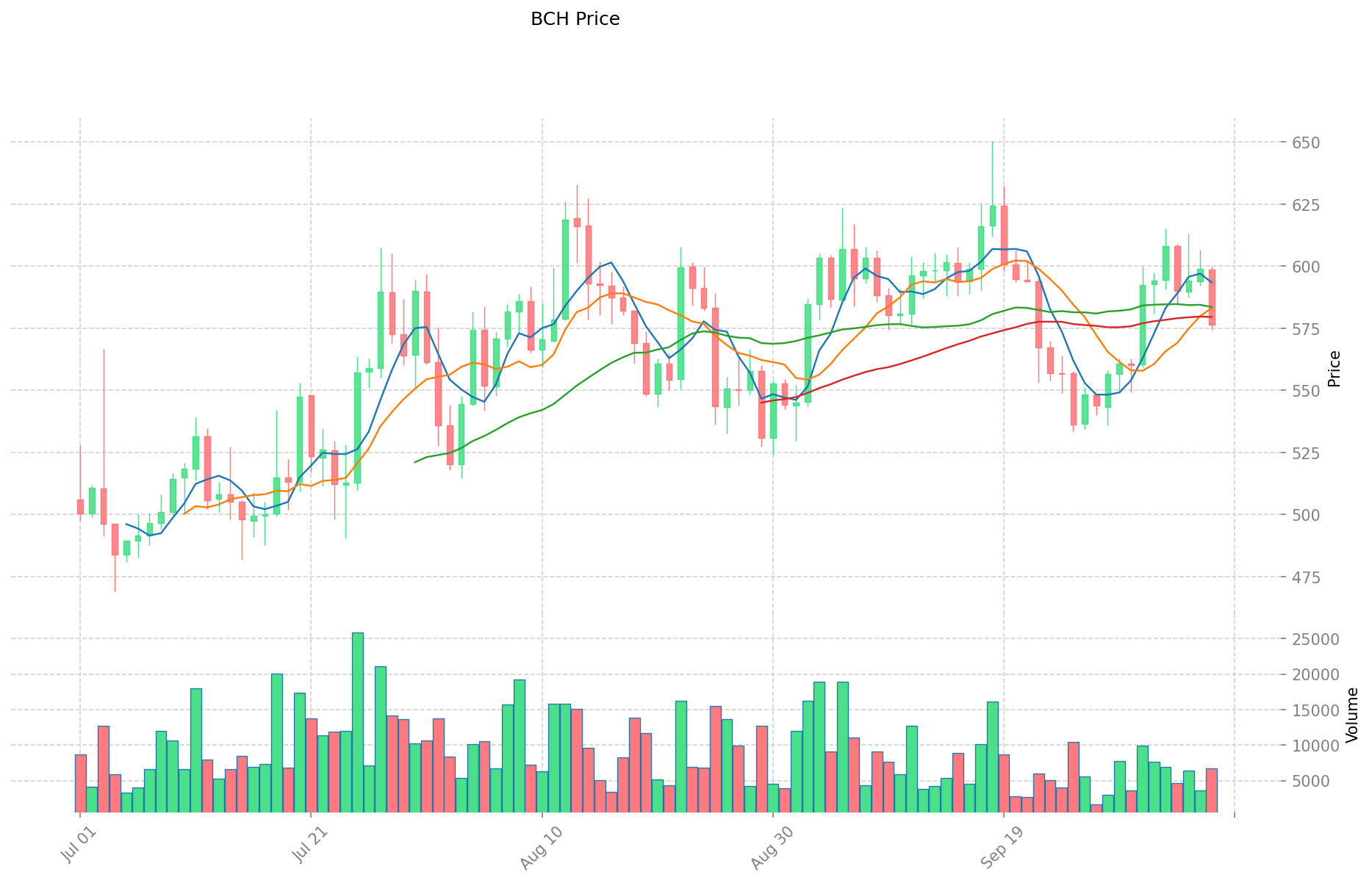FHE vs BCH: Comparing Fully Homomorphic Encryption and Bose-Chaudhuri-Hocquenghem Code for Secure Data Processing
Introduction: FHE vs BCH Investment Comparison
In the cryptocurrency market, the comparison between Mind Network (FHE) and Bitcoin Cash (BCH) has always been a topic that investors can't ignore. The two not only have significant differences in market cap ranking, application scenarios, and price performance, but also represent different cryptocurrency positioning.
Mind Network (FHE): Since its launch, it has gained market recognition for its quantum-resistant Fully Homomorphic Encryption (FHE) infrastructure and secure data and AI computation capabilities.
Bitcoin Cash (BCH): Since its inception in 2017, it has been hailed as a "peer-to-peer electronic cash system," and is one of the cryptocurrencies with high global trading volume and market capitalization.
This article will comprehensively analyze the investment value comparison between FHE and BCH, focusing on historical price trends, supply mechanisms, institutional adoption, technological ecosystems, and future predictions, and attempt to answer the question that investors are most concerned about:
"Which is the better buy right now?" I. Price History Comparison and Current Market Status
Mind Network (FHE) and Bitcoin Cash (BCH) Historical Price Trends
- 2025: FHE reached its all-time high of $0.16569 on August 23, 2025.
- 2017: BCH was created as a hard fork of Bitcoin, with an initial price of $555.89.
- Comparative analysis: In recent market cycles, FHE dropped from its high of $0.16569 to a low of $0.02713, while BCH has shown more stability, currently trading at $578.08.
Current Market Situation (2025-10-08)
- FHE current price: $0.04809
- BCH current price: $578.08
- 24-hour trading volume: $1,117,096 (FHE) vs $3,953,849 (BCH)
- Market Sentiment Index (Fear & Greed Index): 70 (Greed)
Click to view real-time prices:
- View FHE current price Market Price
- View BCH current price Market Price


II. Core Factors Influencing FHE vs BCH Investment Value
Supply Mechanism Comparison (Tokenomics)
- BCH: Limited supply with 21 million coins maximum, sharing Bitcoin's fundamental supply model
- 📌 Historical Pattern: BCH has experienced high price volatility since its 2017 launch, peaking above $4,000 before falling below $100 during market downturns.
Institutional Adoption and Market Applications
- Enterprise Adoption: BCH offers advantages in cross-border payments with lower costs and faster settlement times, particularly attractive in developing countries and for migrant workers
- National Policies: Regulatory environment for cryptocurrencies remains in early development stages, creating uncertainty that affects BCH price and liquidity
Technical Development and Ecosystem Building
- BCH Technical Development: Larger block size than BTC enables faster transactions and lower fees, positioning it as a digital cash system rather than a store of value
- Ecosystem Comparison: While BCH focuses on payments, its blockchain infrastructure can support some decentralized applications (DApps), providing potential for expansion
Macroeconomic Factors and Market Cycles
- Performance in Inflationary Environments: Some investors view BCH as a diversification asset to hedge against uncertainties in traditional financial markets
- Macroeconomic Monetary Policy: Traditional market turbulence, inflation pressure, interest rate policies, and geopolitical risks affect capital allocation between traditional and crypto assets
- Geopolitical Factors: Global events like financial crises, wars, economic sanctions, or major natural disasters influence overall capital flows and market risk preferences, indirectly driving BCH price fluctuations
III. 2025-2030 Price Prediction: FHE vs BCH
Short-term Prediction (2025)
- FHE: Conservative $0.040834 - $0.04804 | Optimistic $0.04804 - $0.0533244
- BCH: Conservative $403.76 - $576.8 | Optimistic $576.8 - $790.216
Mid-term Prediction (2027)
- FHE may enter a growth phase, with prices expected in the range of $0.03706135875 - $0.0604385235
- BCH may enter a bullish market, with prices expected in the range of $490.4853408 - $959.645232
- Key drivers: Institutional fund inflows, ETF, ecosystem development
Long-term Prediction (2030)
- FHE: Base scenario $0.071071303312366 - $0.079855396980187 | Optimistic scenario $0.079855396980187 - $0.091833706527215
- BCH: Base scenario $608.753325375468 - $1067.9882901324 | Optimistic scenario $1067.9882901324 - $1185.467002046964
Disclaimer: This analysis is based on historical data and market projections. Cryptocurrency markets are highly volatile and unpredictable. This information should not be considered as financial advice. Always conduct your own research before making investment decisions.
FHE:
| 年份 | 预测最高价 | 预测平均价格 | 预测最低价 | 涨跌幅 |
|---|---|---|---|---|
| 2025 | 0.0533244 | 0.04804 | 0.040834 | 0 |
| 2026 | 0.06335275 | 0.0506822 | 0.047641268 | 5 |
| 2027 | 0.0604385235 | 0.057017475 | 0.03706135875 | 18 |
| 2028 | 0.0851555989125 | 0.05872799925 | 0.0299512796175 | 22 |
| 2029 | 0.087768994879125 | 0.07194179908125 | 0.044603915430375 | 49 |
| 2030 | 0.091833706527215 | 0.079855396980187 | 0.071071303312366 | 66 |
BCH:
| 年份 | 预测最高价 | 预测平均价格 | 预测最低价 | 涨跌幅 |
|---|---|---|---|---|
| 2025 | 790.216 | 576.8 | 403.76 | 0 |
| 2026 | 738.18864 | 683.508 | 389.59956 | 18 |
| 2027 | 959.645232 | 710.84832 | 490.4853408 | 23 |
| 2028 | 952.18132464 | 835.246776 | 810.18937272 | 44 |
| 2029 | 1242.2625299448 | 893.71405032 | 464.7313061664 | 54 |
| 2030 | 1185.467002046964 | 1067.9882901324 | 608.753325375468 | 84 |
IV. Investment Strategy Comparison: FHE vs BCH
Long-term vs Short-term Investment Strategies
- FHE: Suitable for investors focused on innovative technology and potential ecosystem growth
- BCH: Suitable for investors seeking established networks and payment solutions
Risk Management and Asset Allocation
- Conservative investors: FHE: 10% vs BCH: 90%
- Aggressive investors: FHE: 30% vs BCH: 70%
- Hedging tools: Stablecoin allocation, options, cross-currency portfolios
V. Potential Risk Comparison
Market Risks
- FHE: Higher volatility due to newer project status
- BCH: Susceptible to overall cryptocurrency market trends
Technical Risks
- FHE: Scalability, network stability
- BCH: Mining centralization, potential security vulnerabilities
Regulatory Risks
- Global regulatory policies may impact both, with potentially greater scrutiny on newer projects like FHE
VI. Conclusion: Which Is the Better Buy?
📌 Investment Value Summary:
- FHE advantages: Innovative quantum-resistant technology, potential for growth in secure data and AI computation
- BCH advantages: Established network, focus on efficient payments, wider adoption
✅ Investment Advice:
- New investors: Consider a small allocation to FHE for exposure to innovative technology, larger allocation to BCH for stability
- Experienced investors: Balanced approach with higher risk tolerance for FHE
- Institutional investors: Evaluate BCH for its established history, consider FHE for long-term potential in secure computation
⚠️ Risk Warning: Cryptocurrency markets are highly volatile. This analysis does not constitute investment advice. None
FAQ
Q1: What are the key differences between FHE and BCH? A: FHE is a newer project focusing on quantum-resistant encryption and secure data computation, while BCH is an established cryptocurrency aimed at being a peer-to-peer electronic cash system with faster transactions and lower fees than Bitcoin.
Q2: Which cryptocurrency has shown better price stability? A: Based on the provided information, BCH has shown more price stability compared to FHE. BCH is currently trading at $578.08, while FHE has experienced significant volatility, dropping from its all-time high of $0.16569 to $0.04809.
Q3: How do the supply mechanisms of FHE and BCH compare? A: BCH has a limited supply of 21 million coins, similar to Bitcoin's supply model. The supply mechanism for FHE is not explicitly stated in the given information.
Q4: What are the main risks associated with investing in FHE and BCH? A: FHE risks include higher volatility due to its newer status, scalability issues, and network stability concerns. BCH risks involve mining centralization, potential security vulnerabilities, and susceptibility to overall cryptocurrency market trends. Both face regulatory risks.
Q5: How do institutional adoption and market applications differ between FHE and BCH? A: BCH has advantages in cross-border payments with lower costs and faster settlement times, particularly attractive in developing countries. FHE's institutional adoption and market applications are not explicitly mentioned, but it's focused on secure data and AI computation capabilities.
Q6: What are the long-term price predictions for FHE and BCH by 2030? A: For FHE, the base scenario predicts a range of $0.071071303312366 - $0.079855396980187, with an optimistic scenario of $0.079855396980187 - $0.091833706527215. For BCH, the base scenario predicts $608.753325375468 - $1067.9882901324, with an optimistic scenario of $1067.9882901324 - $1185.467002046964.
Q7: How should investors allocate their portfolio between FHE and BCH? A: Conservative investors might consider allocating 10% to FHE and 90% to BCH, while more aggressive investors could allocate 30% to FHE and 70% to BCH. New investors are advised to have a larger allocation to BCH for stability, with a small allocation to FHE for exposure to innovative technology.